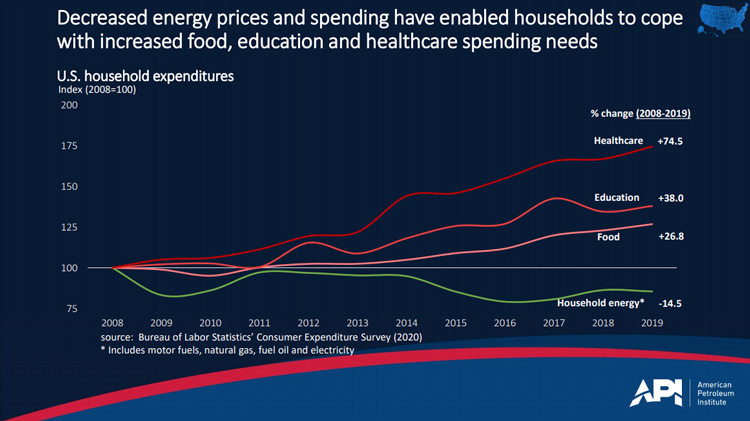Safeguarding America's Energy Future
While consumer spending on health care, education and food has surged over the last decade, U.S. household energy expenditures have decreased nearly 15%. Thanks to the shale revolution, American families benefit from an abundance of homegrown natural gas and oil, which provides affordable, reliable energy and good-paying jobs.

The natural gas and oil industry is poised to accelerate America’s economic recovery, producing low-cost and lower-carbon fuels to meet the world’s long-term energy needs. But unrealistic and unpopular policy proposals that block infrastructure expansion and prohibit resource development could reverse our hard-earned energy progress. Americans have long sought to reduce our dependence on foreign oil, and the overwhelming majority of voters recognize the value of U.S. energy security – and support elected officials who do too.
Protecting American Jobs
The natural gas and oil industry employs a workforce of more than 10 million Americans in energy production, transport, refining and construction, involving projects with better wages, longer durations and greater opportunities than those in the renewable industries, according to recent studies. Proposals to overhaul the workforce – or ban the technologies that enable production – could result in millions of domestic job losses alongside rising energy costs.
Expanding Domestic Production
Access to energy produced on federal lands and waters is critical to strengthening America’s energy security. Per API’s latest economic analysis, a nationwide ban on federal energy leasing and development could eliminate jobs, increase greenhouse gas emissions and lead to $700 billion in cumulative GDP losses through 2030. With U.S. energy leadership at stake, we should be expanding – not restricting – natural gas and oil exploration and production.
Modernizing Critical Infrastructure
Politically motivated attempts to delay much-needed infrastructure projects, like the Dakota Access Pipeline or Keystone XL, are short-sighted and costly for American consumers. Pipelines remain the safest and most environmentally friendly method of transporting natural gas and oil for everyday use, and removing the red tape associated with their construction supports energy affordability and job creation.


